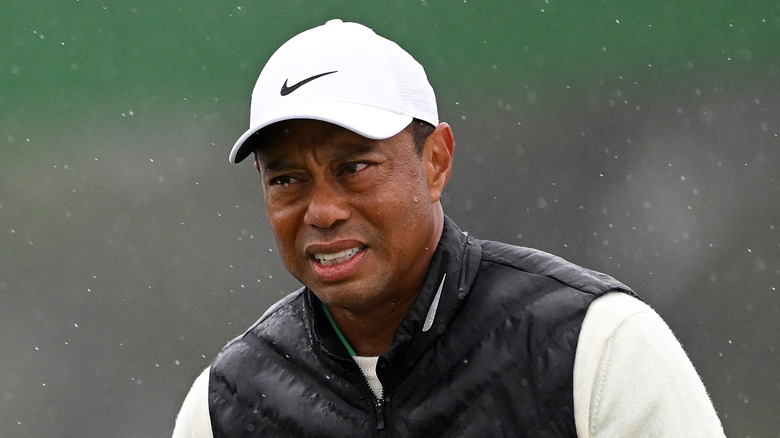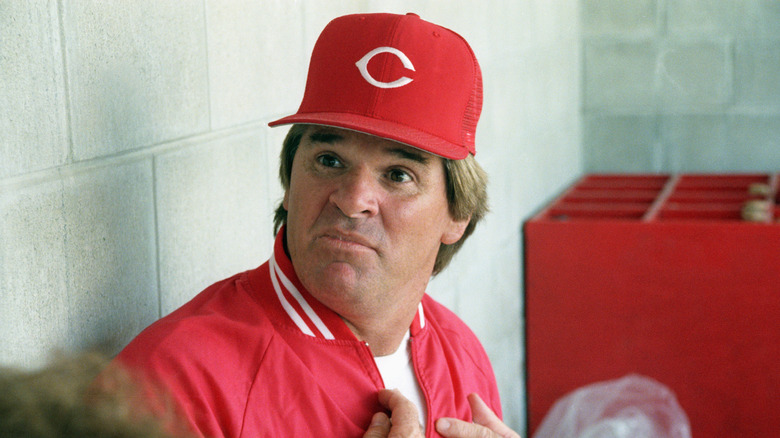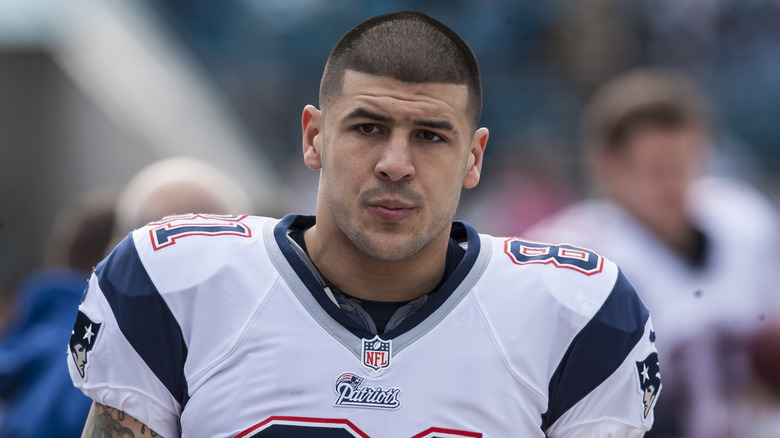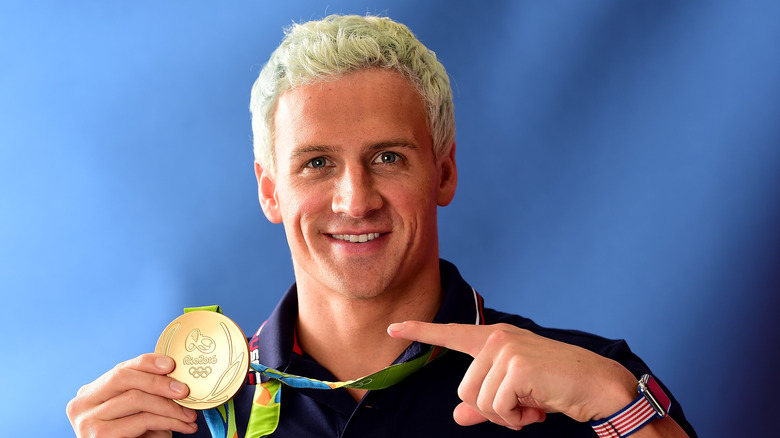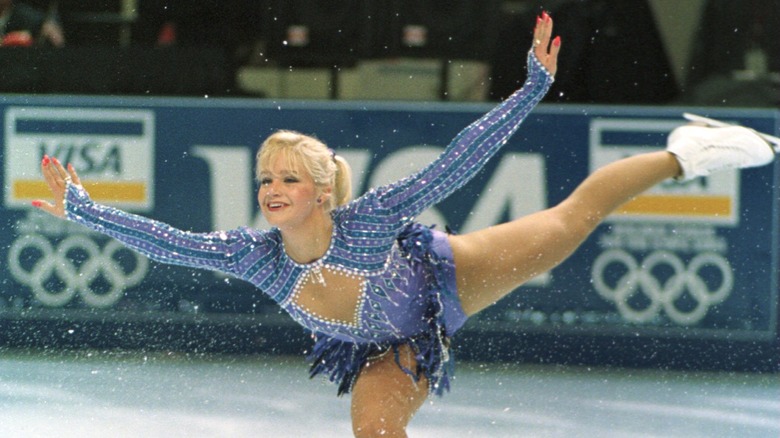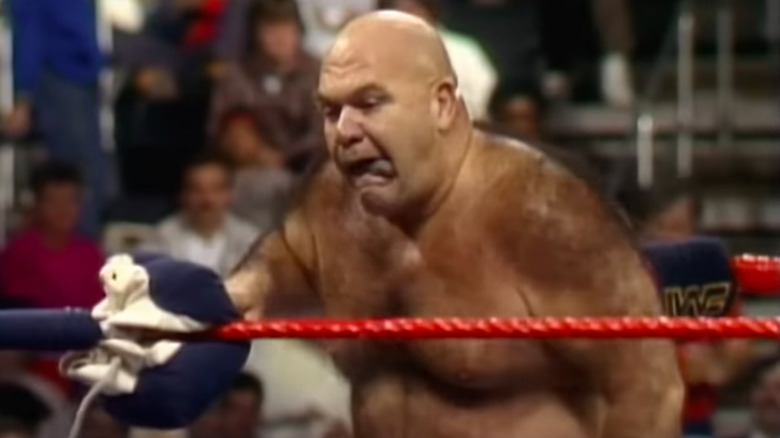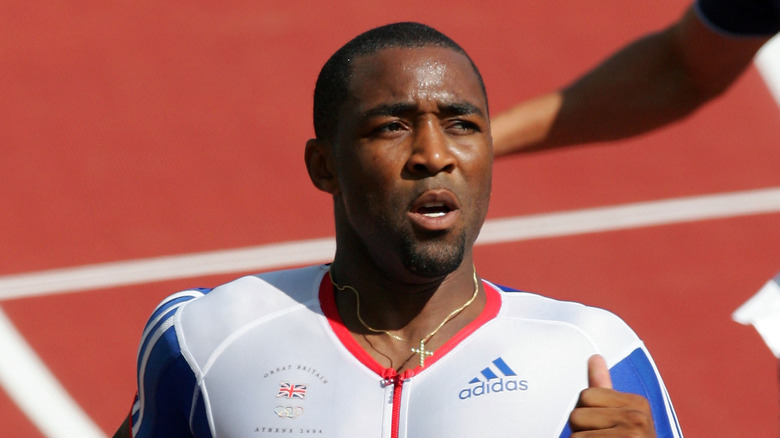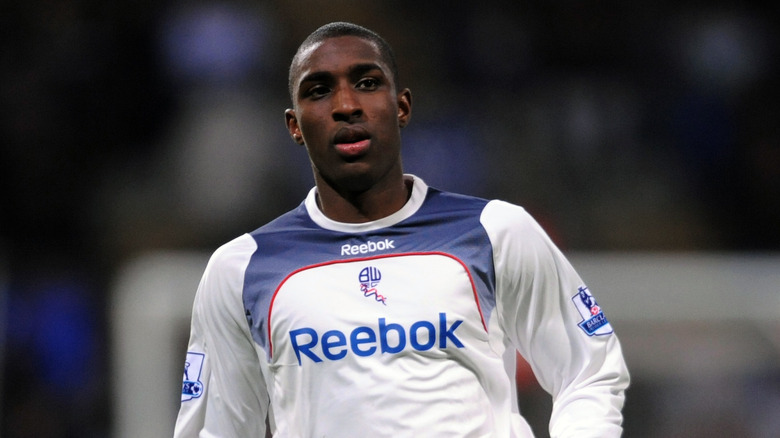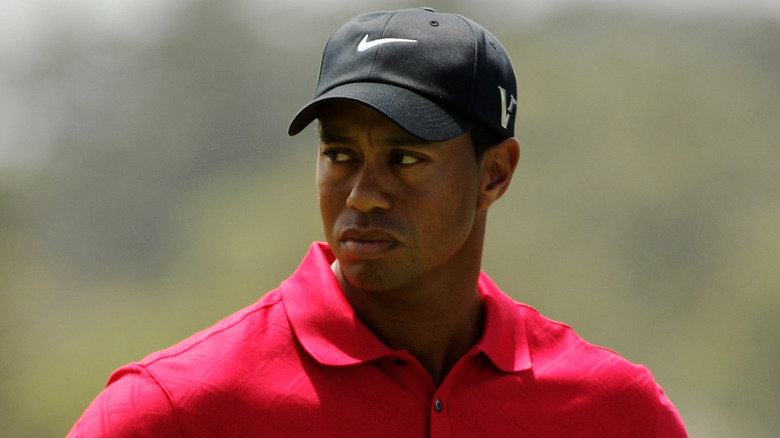Athletes Who Led Crazy Double Lives
We may receive a commission on purchases made from links.
Throughout the world, top-level athletes continue to be celebrated for their achievements in their fields. That can mean big paydays for those hired to play in the NFL, NBA, NHL, the world of professional soccer, and various other sports. That's also true for the elite athletes who compete in the Olympics, with potential endorsement deals worth millions awaiting those who manage to bring home gold medals to their respective nations.
Given all the media attention that's typically heaped upon these sports stars, it's always surprising when details emerge about them that are at complete odds with the carefully constructed public image that has been presented to fans. Sure, it's not unusual for someone to keep parts of their private lives hidden from view, yet there are also those times when what's being concealed is so outrageous that it's led to scandal, controversy, and, occasionally, prison sentences. With that in mind, keep on reading for a look at some athletes who led crazy double lives.
Olympic snowboarder Ryan Wedding was allegedly a murderous drug dealer
Ryan Wedding was one of Canada's top snowboarders when he won a spot on the country's Olympic team, competing in the parallel giant slalom event during the 2002 Winter Games in Salt Lake City. He finished in 24th place. In the years since then, Wedding found far more success in another field: drug trafficking. The former Olympian was named — but not charged — in a police investigation into a large-scale British Columbia marijuana-growing operation in 2006. Two years later, he was caught red-handed trying to purchase cocaine from a federal agent in a sting operation. For that, he was sentenced to four years behind bars.
After his release, Wedding continued down his criminal path with a vengeance. In a 53-page federal indictment that was released in October 2024, authorities alleged that Wedding was the leader of a multinational cocaine-trafficking empire, responsible for ordering the murders of four people. Wedding has been charged with eight felonies, including three counts of murder. "As alleged in the indictment, an Olympic athlete-turned-drug lord is now charged with leading a transnational organized crime group that engaged in cocaine trafficking and murder, including of innocent civilians," U.S. Attorney for the Central District of California Martin Estrada said in a statement, as reported by TMZ.
While he was charged for his role in the drug organization in October 2024, as of this writing, Wedding remains a fugitive, believed to be in Mexico, under the protection of the powerful Sinaloa Cartel. The FBI offered a $50,000 reward for anyone offering information leading to Wedding's arrest.
Three-time Olympian Suzy Favor Hamilton had a side gig as an escort
American runner Suzy Favor Hamilton competed in the Olympic Games three times: in Barcelona in 1992, in Atlanta in 1996, and in Sydney in 2000. She was hopeful of winning her first medal in the latter when she fell during the 1,500 final, claiming she was injured. She later confessed that she'd pretended to fall, admitting that she panicked when other runners passed her. "And that was the moment of my downward spiral. I didn't know at the time, but that was Step One of terrible things to happen," she told ABC News.
According to Favor Hamilton, that kicked off a series of events that led her to become a high-priced escort in Las Vegas. Using the pseudonym "Kelly Lundy," Favor Hamilton — who, at the time, was married and a mother — tried to keep that part of her life under wraps. "[On one] particular day I had run a half marathon in the morning, in a different state, hopped on an airplane after the half marathon, basically rushed to the airport, got to Vegas, had five appointments," she said.
Her double life was exposed in 2012 when a reporter from the website, TheSmokingGun.com, found out who escort "Kelly Lundy" really was, and shared the information with the world. In retrospect and with a bipolar disorder diagnosis, Favor Hamilton explained to ABC News that her being prescribed with antidepressants — not the correct medication for bipolar disorder — seemingly caused her to be put in a "manic" state, which resulted in both the "hyper-sexuality" and the desire for "high-risk behavior" that led her to it.
Cincinnati Reds legend Pete Rose was a high-rolling gambler who bet on his own team
As star player for the Cincinnati Reds during the 1960s, '70s, and '80s, Pete Rose earned the nickname "Charlie Hustle" for his fierce competitiveness on the diamond, setting a still-unbroken record of 4,256 career hits. Yet behind the scenes, Rose had another obsession that was both separate from baseball while also being connected to it.
In 1989, MLB Commissioner Peter Ueberroth announced the launch of an investigation into Rose based on allegations that he was gambling on baseball games — including games in which he was both player and manager — throughout the late 1980s. When those allegations were proven to be fact, Rose was forced to acknowledge his secret double life as a gambler. Because he had broken the MLB's rule prohibiting any player or employee from betting on baseball, Rose was banned from professional baseball for life. Prior to his death in October 2024, Rose had made numerous efforts to have that ban dropped and inducted into the Baseball Hall of Fame, but he was unsuccessful.
In his 2019 memoir, "Play Hungry: The Making of a Baseball Player," Rose insisted he never bet against his team and didn't see why his gambling was such a big deal. "I don't think betting is morally wrong. I don't even think betting on baseball is morally wrong," he wrote (via ESPN). "There are legal ways, and there are illegal ways, and betting on baseball the way I did was against the rules of baseball."
Was Aaron Hernandez hiding a part of himself — and did that secret influence his later crime?
Aaron Hernandez was picked up by the New England Patriots in the fourth round of the 2010 NFL draft, passed over by other teams due to failed drug tests and rumors of personal misconduct. Hernandez's performance, including scoring a touchdown in the 2012 Super Bowl, led the Patriots to sign him to a five-year, $40-million extension contract that year.
In 2013, it all came crashing down when the tight end was arrested and charged with the murder of fellow football player Odin Lloyd; the Patriots immediately released him from their roster. While imprisoned awaiting trial, Hernandez was charged with two more counts of murder, accused of killing two drug dealers in 2012. After Hernandez's highly-publicized trial, he was convicted on charges of murdering Lloyd, but acquitted on the other murder charges. In April 2017, Hernandez was found dead in his cell, with authorities ruling that he had taken his own life. The following month, Hernandez's murder conviction was posthumously overturned, but was ultimately reinstated in 2019.
After his death, there has been much speculation that Hernandez was bisexual and had been living a double life, having affairs with men. While that was presented as a motive for his murder of Lloyd — that Lloyd potentially knew about Hernandez's sexuality, and Hernandez killed him to protect his secret — no motive has ever actually been definitively established.
If you or someone you know is struggling or in crisis, help is available. Call or text 988 or chat 988lifeline.org.
Ryan Lochte's clean-cut image was exposed when he tried to cover up a booze-fueled vandalism spree
Swimmer Ryan Lochte first gained Olympic glory in 2004, winning a gold medal during the Athens games. He won an additional two gold medals in Beijing in 2008, two more in London in 2012, and another gold in 2016, quickly becoming America's swimming sweetheart. It was during the 2016 games, however, that Lochte became caught up in a bizarre scandal.
It all began when Lochte and three other swimmers claimed that their taxi had been stopped by thieves costumed as Rio de Janeiro police officers, who robbed the athletes at gunpoint. Questions emerged about why they waited several hours to report the alleged incident to the International Olympic Committee, with the swimmer telling USA Today that the delay was "because we were afraid we'd get in trouble." The situation grew even murkier when the IOC insisted that there had been no robbery.
Lochte's clean-cut image took a big hit when an investigation uncovered CCTV footage revealing Lochte and the others had actually vandalized a gas station bathroom while intoxicated after a night of drinking. The supposed policemen were actually the store's security demanding they pay for the damages. Once the truth was revealed, Lochte attempted to repair his tarnished public image with a lengthy apology that he shared on Instagram. "I want to apologize for my behavior last weekend," he wrote. "I over-exaggerated that story," Lochte stated during a subsequent interview with NBC News.
Legendary Olympian Caitlyn Jenner transitioned later in life
While Caitlyn Jenner is no stranger to controversy these days, the athlete initially skyrocketed to fame after winning gold in the men's decathlon at the 1976 Olympic Games in Montreal, setting a world record in the process. For Jenner, Olympic glory and the accompanying fame proved to be a double-edged sword, something she revealed decades later after coming out as transgender in 2015.
Back in 1976, Jenner had been grappling with gender dysphoria and couldn't escape the irony that the athletic victory she'd worked so hard to achieve would now cement an identity she was desperate to change. "I remember getting up the next morning and walking to the bathroom without a stitch of clothes on," Jenner recalled in a 2019 interview with the BBC. "The gold medal was sitting there on the table. I put it around my neck, looked in the mirror and asked myself, 'Am I stuck with this person the rest of my life?'" Her prediction nearly came to pass; while she considered transitioning in the 1980s, she ultimately decided against it at the time, finally coming out three decades later.
When the BBC asked what her greatest achievement was, Jenner was definitive in her response. "I would have to put my identity as higher," Jenner declared. "It was tougher to do. I trained 12 years for the Olympic Games. I trained 65 years to transition in 2015."
Figure skater Nicole Bobek hid her secret life of drugs and robbery
Prior to competing in the 1998 Winter Olympics in Nagano, finishing in 17th place, figure skater Nicole Bobek was champion at the U.S. Senior Nationals in 1995, winning a bronze medal at the World Championships that same year. She eventually joined the Champions on Ice tour in the early 2000s. That was where she befriended fellow skater Johnny Weir, who told ESPN he heard rumors that she was using drugs, but that he never witnessed that personally.
Those rumors were confirmed in 2009, when she was caught up in a massive drug bust and placed under arrest. Bobek was charged with conspiracy to distribute methamphetamine and faced a potential 10-year prison sentence. She entered a guilty plea and was sentenced to five years' probation. "It's been a long year and I'm doing everything I can to get back on that ice," she said after her sentencing, as reported by The Jersey Journal.
Her lawyer, Samuel DeLuca, explained that Bobek had trained relentlessly since the age of 3 and turned to drugs when her athletic career began slipping away from her. "She was nurtured, she was coddled, as all the professionals are," said DeLuca. "They don't live in the real world ... When the star started fading, she was not prepared. She found herself in a bad world, a sleazy world, and she could not handle it."
Pro wrestler George 'The Animal' Steele was a schoolteacher who kept his wrestling career a secret
To pro wrestling fans, he was green-tongued maniac George "The Animal" Steele, a fixture in the WWE during its 1980s heyday. To his friends, family, and colleagues, however, he was Jim Myers, a high school teacher and wrestling coach in Madison Heights, Michigan. As Myers explained in an interview with George Dorunda, he was teaching when he first ventured into pro wrestling to earn some extra money. "I ended up becoming a local wrestler with a mask on," he said, recalling how he would finish coaching at school and then drive more than 100 miles to wrestle in a match in another state.
At that time, he kept his day job hidden. "When I was wrestling in New York or the northeast, [students and colleagues] didn't know that back in Michigan," he said while appearing on "Busted Open Radio" (via Pro Wrestling Stories). He eventually ditched the mask and adopted the George "The Animal" Steele persona when wrestling out of town.
"Back in Michigan, I was wearing a mask, so, you know, the students really never knew what was going on," he said, noting that he would occasionally be recognized by students that moved to Michigan from where he wrestled out of town. "And I'd simply look at him and say, 'Do you really think I'm that ugly?'" He was inducted into the WWE Hall of Fame in 1995, and he died in 2017 at age 79.
Gold medalist sprinter Darren Campbell was a gang member
While growing up in Manchester, England, future Olympic sprinter Darren Campbell fell in with a group of friends who had a knack for getting into trouble. "Initially it was a brotherhood, a group," the British sprinter told BBC Sports. "Unfortunately, as time went on it became more of a gang."
Dreaming of one day competing in the Olympics, Campbell trained religiously. He did not, however, cut ties with his gang, but did his best to keep those two competing aspects of his life separate. "It was like I was living in two different worlds," he explained. "I had this athletics world, then I had this other world with my friends, with people who I'd grown up with. They protected me and I protected them."
When beef erupted between Campbell's gang and a rival gang, his mother learned that her son's name was on a "hit list" and became determined to get him out of a situation that threatened to not only derail his athletic dreams but possibly end his life. "When she asked me to leave Manchester, I just knew I had to go," he said. Not long after, Campbell went on on to compete in the 2000 Olympic Games in Sydney, where he won a silver medal, and he won gold at the next games, held in 2004 in Athens.
British soccer star Jlloyd Samuel's death in a car crash revealed his shocking double life
British soccer player Jlloyd Samuel played for Premier League team the Bolton Wanderers, between 2007 and 2011. In 2018, Samuel tragically died in a car crash, leaving behind his wife of 10 years, Emma Pritchard, their three children together, and his child from a previous relationship.
Shortly after the fatal accident, Samuel's widow was told that photos of her husband were all over another woman's Instagram account. That led her to make some shocking revelations, which formed the basis of the 2022 documentary, "The Footballer, His Wife, and the Crash."
In the documentary, Pritchard revealed that she came to discover she wasn't her late husband's only wife. In fact, he had another life in Iran, where he had reportedly been married to another woman since 2013, even converting to Islam in order to marry her. "It was like a stab in the heart," she said in the film, as reported by the Daily Mail. "I'm trying to grieve for my husband and then I find out he's got a full-on other life for seven years. Never ever has he asked me for a divorce."
Tiger Woods was having multiple affairs while maintaining the wholesome façade of a devoted family man
After pro golfer Tiger Woods married Swedish model Elin Nordegren in 2004, they went on to have two children. By all accounts, Woods was devoted to his wife and family. That proved to be a façade when, in late 2009, reports emerged alleging he was having an affair with Rachel Uchitel, a nightclub host in NYC. This was followed by increasingly sordid reports of multiple affairs with many more women.
Soon after, Woods announced he was taking a hiatus from golf and checked into a clinic specializing in the treatment of addiction. Meanwhile, rumors — which later proved to be true — swirled that Nordegren was preparing to file for divorce.
The carefully constructed public image of Woods as a faithful husband soon crumbled. With his reputation in tatters, the companies that had sponsored him lost an estimated $12 billion. His actions not only derailed his career and Wood's marriage to Nordegren, the ensuing divorce reportedly cost him a staggering $100 million. "I was unfaithful. I had affairs. I cheated," Woods confessed during a press conference, as reported by ESPN. "What I did was not acceptable."

